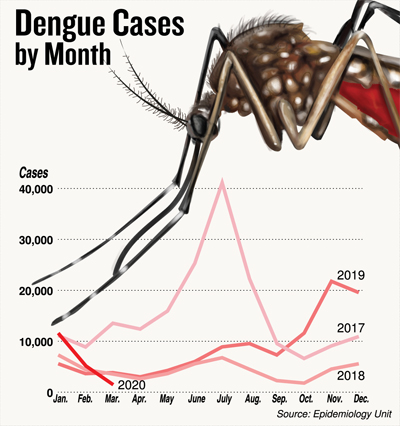News
Monsoon coming, with an old health enemy lurking
 Another outbreak of dengue is looming around the corner with the inter-monsoon expected at the end of April, the National Dengue Control Unit (NCDU) has warned.
Another outbreak of dengue is looming around the corner with the inter-monsoon expected at the end of April, the National Dengue Control Unit (NCDU) has warned.
It said 18,500 dengue fever cases have been reported so far this year with the highest number, 2,683 cases, being reported from the Colombo district.
Infection has been dropping since January, when 11,595 cases were reported. In February there were 5,316 cases, in March, 1,482, and so far in April, 107 cases.
NDCU Director Dr. Anura Jayasekara said there was no room for complacency over the reduction in infection rates.
Illness could increase in the coming weeks because of weather conditions, he said. With health officials taken up with restricting the spread of COVID-19 the public needed to assume greater personal responsibility in combating dengue.
In explaining how people can distinguish between the two virus-caused illnesses, Dr. Jayasekara said: “Dengue fever causes a severe flu-like illness and muscle pain, sometimes vomiting or a rash. Unlike COVID-19, it rarely has respiratory symptoms.”
Anyone experiencing these symptoms should call 1390 or go to the nearest hospital.
“If schools and universities are going to reopen we have to ensure a clean and safe environment before we start classes,” Dr. Jayasekara added.
About 90,000 dengue cases, with 100 deaths, were reported in 2019.
The Chief Medical Officer of the Colombo Municipal Council (CMC), Dr. Ruwan Wijayamuni, reminded the public to be vigilant about clearing mosquito breeding sites in ad around their homes on a regular basis as people were confined to their homes.
He emphasised that Colombo has a high prevalence of dengue since it is densely populated and generates a large amount of garbage.
Dr. Vijayamuni said Modara, Mattakuliya, Kirula, Kirulapone, Maligawatte, Wellawatte North and Dematagoda are the most vulnerable areas in the district.
“We can’t visit people’s homes at the moment to make them aware of the disease but we’re asking everyone to eliminate anything water could collect in, such as discarded plastic cups, tins, bottles, coconut shells, and so on,” he said.
“Make sure you do not let water collect in your gardens either. Check hidden water bodies such as drains, tanks and manholes on a regular basis and keep them clean.”


